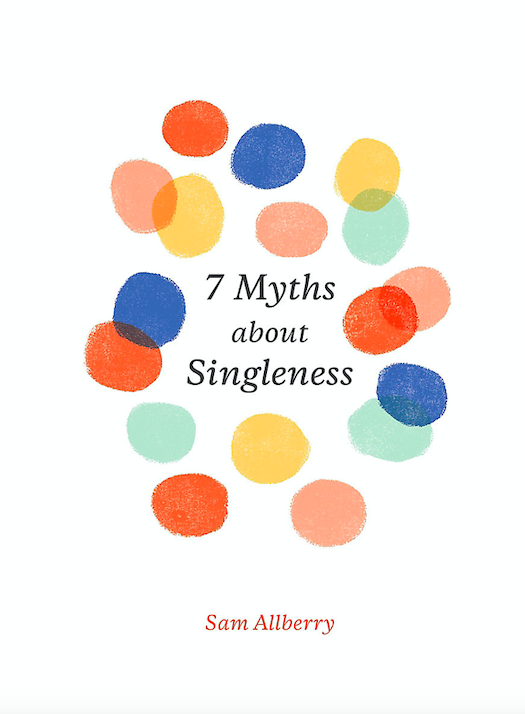 Each month, you’ll hear from one of us on what we’re reading and a little bit about the book. This month two of us are sharing book notes on Sam Allberry’s 7 Myths about Singleness from both a single and married perspective. Enjoy!
Each month, you’ll hear from one of us on what we’re reading and a little bit about the book. This month two of us are sharing book notes on Sam Allberry’s 7 Myths about Singleness from both a single and married perspective. Enjoy!
Single perspective:
I knew I wanted to read Sam Allberry’s 7 Myths about Singleness the first time I saw the title. Having heard Allberry speak on singleness at a few conferences, I knew he would bring wisdom to the topic. As someone who is single, Allberry understands the challenges and the gifts being single brings.
Having read it, I knew I wanted my married friends to read it as well. Not all of the myths Allberry covers are myths I’ve heard in our churches, but many of them are. He uses biblical truth and real-life examples to prove untrue myths we’ve often heard and believed:
- Singleness Is Too Hard
- Singleness Requires a Special Calling
- Singleness Means No Intimacy
- Singleness Means No Family
- Singleness Hinders Ministry
- Singleness Wastes Your Sexuality
- Singleness Is Easy.
Many of us who are single probably already realize some of these points are myths. We know the truths about singleness because we live it. However, we can get caught up in believing that these myths are true. We can easily become focused on what’s missing in our lives and wrapped up in the falsehoods we hear, even if they aren’t true of our own experiences.
This book helped point me to what is true about God, no matter my marital status. One of my favorite quotes from the book points to this:
But while single people may chuckle at the idea of God giving such a potentially unwanted gift, we need to be careful and recognize what and who it is we’re laughing at. God is no fool. He is not the uncle who still thinks you’re twelve when you’re well into your thirties and sends you childish gifts. He is the Creator who made you and knows you. He is the One who orders all things and does so for your good. To roll your eyes at what a well-meaning but mistaken relative gives us is one thing; to roll our eyes at omniscience is another. If we balk at the idea of singleness being a gift, it is not because God has not understood us but because we have not understood him.”
While we may not always understand why God has not given us a spouse, we can know He understands singleness can be difficult. He understands our needs and desires; He is good; and He loves us. Allberry makes this clear throughout the book.
This book helped me feel seen by God and His people and not alone—two things single people often struggle to feel. I recommend it to other single people for those reasons.
More than that, though, I recommend married people read it, especially if you’re in a leadership position with people who are single. That’s why we wanted to have two people give you notes on this book—one single, one married. We want you to know it’s helpful for both groups of people.
 Elizabeth Hyndman reads, writes, and tweets. Officially, she’s a social media strategist at Lifeway. Elizabeth grew up in Nashville, sips chai lattes every chance she can get, and believes everyone should have a “funny picture” pose at the ready.
Elizabeth Hyndman reads, writes, and tweets. Officially, she’s a social media strategist at Lifeway. Elizabeth grew up in Nashville, sips chai lattes every chance she can get, and believes everyone should have a “funny picture” pose at the ready.
Married perspective:
Sam Allberry got my attention in 2013 when I read Is God anti-gay? It wasn’t so much what Allberry taught me about sexuality that impressed me in that book, but what he taught me about the gospel. His application of the gospel to the question at hand was concise, understandable, helpful, and clear. In 7 Myths of Singleness, Allberry brings the same gospel clarity to the topic of singleness.
The book is creatively and concisely organized. Allberry’s central argument, as he debunks all seven myths, is clear: “It is in the interests of all of us, the whole church, single and married, to understand the positive vision the Bible gives us of singleness.”
But is that really true? Does understanding the Bible’s vision of singleness really benefit married couples? Skeptical readers may ask this question, and in our romance-obsessed culture, who could blame them? Allberry answers such skeptical readers, as he makes good on his promise to show the importance of the Bible’s vision of singleness—even for married people like me.
The Myths Matter for Married People Too
7 Myths of Singleness was instructive not just in what it taught me about singleness, but what it taught me about marriage. In the first place, many of the myths Allberry dispels are myths that people believe about marriage, too.
Take, for example, the first myth: “Singleness Is Too Hard.”  The twelve disciples of Jesus, upon learning they couldn’t divorce a woman for any and every reason they wanted, thought marriage was too hard (Matt. 19:3-12). Even though the more common assumption in Western Christian cultures is that marriage would be easier than singleness, there are countless Christian couples who think like the Twelve. Faced with the discomfort of sharing everything, the duty of self-sacrifice, and the death of countless wish-dreams, they begin to entertain the idea that singleness would be easier. And if singleness would be easier, it would be better. And if it would be better, what am I doing staying in this marriage?
The twelve disciples of Jesus, upon learning they couldn’t divorce a woman for any and every reason they wanted, thought marriage was too hard (Matt. 19:3-12). Even though the more common assumption in Western Christian cultures is that marriage would be easier than singleness, there are countless Christian couples who think like the Twelve. Faced with the discomfort of sharing everything, the duty of self-sacrifice, and the death of countless wish-dreams, they begin to entertain the idea that singleness would be easier. And if singleness would be easier, it would be better. And if it would be better, what am I doing staying in this marriage?
But Jesus doesn’t call us to the wide and easy road, He calls us to the narrow road that leads to life (Matt. 7:13). The reality for all people is that, whatever calling God has given us—singleness or marriage—it is going to be hard, but not too hard. God will not allow any temptation to come upon us that is not “common to humanity” (1 Cor. 10:13, CSB). The difficulties one faces in singleness and marriage are common to humanity. The grass isn’t greener—or browner—on the other side.
Friendship Is Hard … and Worth It
Allberry’s book also made me think long and hard about friendship. “All of us need friends—married people every bit as much as singles,” he writes. But this doesn’t come without a challenge. “It’s not always easy to foster close friendships when you’re established as a family, but it’s a vital discipline.”
Many newly married couples have shunned their friends for the excitement of adventure and discovery in the first months of marriage, but this typically wanes. After the honeymoon phase, they make their way back into the rhythms of friendship. But this isn’t always so. Frankly, the best of marriages can provide fertile soil for the subtle temptation to think you don’t need anyone else. I just prefer time with my wife to friends. It’s so much easier to cook and clean up for two than for three or four. Wouldn’t it be nice to just stay in tonight? As necessary as these things sometimes are, Allberry is right to challenge us.
Single and Married People Need Each Other
Just as I, as a married man, need to maintain friendships, I also need to develop and maintain relationships with my single friends. I need them, and they need me.
This is perhaps the most important and helpful theme of 7 Myths of Singleness. Allberry profoundly makes the case that, in God’s family, we are all in this together, and we need one another. Single friends, we can survive without you, but we will never thrive without you. Married friends, our single friends can survive without us, but they will never thrive without us.
Why? Practically, for a thousand reasons. But fundamentally, because we are a family. “When God draws people to himself, he draws them to one another as well. The people of Jesus Christ are to be a family.” In other words, the nuclear family isn’t enough. I need more than my wife to thrive. I need the community of the redeemed—rich and poor, old and young, married and single.
 Taylor Combs is associate publisher of Christian Living and Leadership books at B&H Publishing Group. He graduated with a BA in Theology from Lipscomb University and a MDiv from The Southern Baptist Theological Seminary, and is currently pursuing a PhD from Midwestern Baptist Theological Seminary. A native of Lexington, Kentucky, Taylor now lives in East Nashville, Tennessee, with his wife, Lindsay, and their Doberman, Kiko.
Taylor Combs is associate publisher of Christian Living and Leadership books at B&H Publishing Group. He graduated with a BA in Theology from Lipscomb University and a MDiv from The Southern Baptist Theological Seminary, and is currently pursuing a PhD from Midwestern Baptist Theological Seminary. A native of Lexington, Kentucky, Taylor now lives in East Nashville, Tennessee, with his wife, Lindsay, and their Doberman, Kiko.

